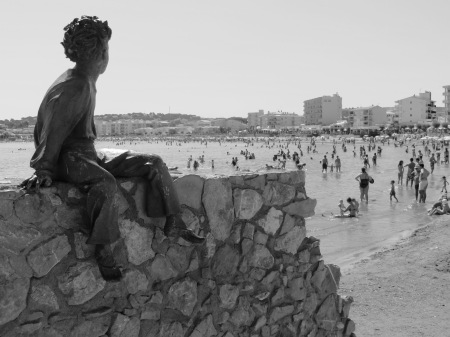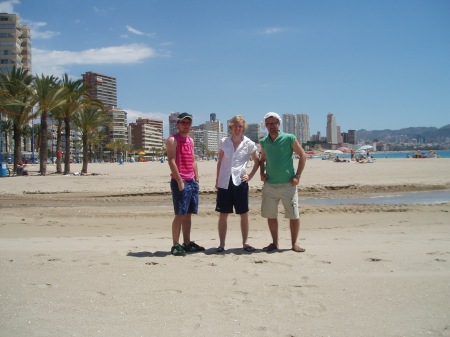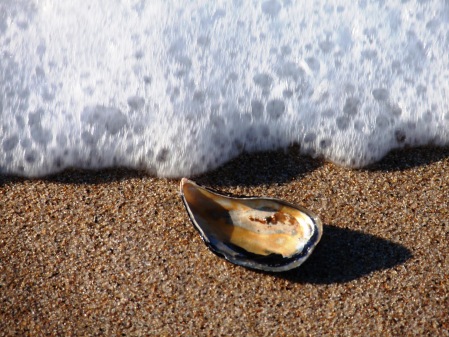Norman Lewis – Voices of the Old Sea…
“By the end…it was clear that Spain’s spiritual and cultural isolation was at an end, overwhelmed by the great alien invasion from the North of money and freedoms. Spain became the most visited tourist country in the World, and slowly, as the foreigners poured in, its identity was submerged, its life-style altered more in a single decade than in the previous century.” – Norman Lewis – ‘Voices of the Old Sea’.

The Costa Brava in Spain…
The north east coast of Spain was first named Costa Brava by the Catalan journalist and poet Ferran Agulló in an article published in the newspaper La Veu de Catalunya in September 1908 when he applied the name to the stretch of rugged landscape and coast which runs from the river Tordera, near Blanes, to Banyuls.
As I understand it, it is rather difficult to agree an exact English translation for Costa Brava. ‘Rugged Coast’ is most often suggested, but a Catalan will tell you that ‘brava’ is a word with a meaning that goes beyond ‘rugged’ to ‘wild’ or ‘fierce’, even ‘savage’.
Spanish mass tourism began on the Costa Brava, a truly beautiful stretch of coastline, overlooked by the Pyrenees in the north and which wanders down the coast of the Catalan province of Girona. Along much of its length it is a coastline characterised by intimidating crags and cliffs, nicked by tiny coves and secret bays and backed with rough pine forests stretching all the way down to the water line of the blue Mediterranean.
In preparation for visiting the Costa Brava I read the book ‘Voices of the Old Sea’ by the travel writer Norman Lewis who (allegedly) spent three summers in the fishing village he called Farol and where he watched, recorded and lamented as modern tourism replaced traditional rural industries and he mourned the changes that take place.
The book is an account of catastrophic social change punctuated with recollections of conversations and stories of strange Catalan customs – such the local tradition of drowning of a mouse in the first barrel of newly-pressed grapes, walking over red hot coals and jumping over new born babies. It is hard to tell how much embellishment Lewis allowed himself, probably quite a lot I imagine, because he wrote the book many years later from old notes and he even neglects to mention that he travelled there in a Ford Buick with his wife and family and not as a solo traveller as he would like the reader to believe.
Slowly over the three sections of the book he explains how he integrated himself into a community that had barely changed for hundreds of years, where people adhered to tradition, superstitions ruled, and the ageless rhythms of the year continued as they had for centuries.
A feud with a neighbouring village, the patriarchs who meet in the bar, the travelling clairvoyant who predicts the best time to fish for tuna or sardines and all the details of village life are recounted in a way that is appropriate to the pace of life there.
He asks a local man to explain about life and he replies: “How can anyone put it? One thing is certain – here we have always been and here, whatever happens, we shall remain, listening to the voices of the old sea.”
But it is affection tinged with melancholy and despair, for Lewis was observing life on the verge of headlong and irreversible change, the cork forests that were the life blood of their neighbours were suffering blight, the fish were not as plentiful as they once were and worst of all, the first waves of tourism were beginning to lap at the shores of the Costa Brava and a way of life was heading for extinction.
In the 1950s, the Costa Brava was identified by the Spanish government and by local entrepreneurs as being a coastline suitable for substantial development as a holiday destination to compete with the south of France and mainly for package holiday tourists from Northern Europe.
It was a sort of perfect ‘Surf and Turf’ with a combination of a very good summer climate, a green environment, excellent beaches and a favourable foreign exchange rate, which made Spain a relatively inexpensive tourist destination and this was exploited by the construction of large numbers of hotels and apartments in such seaside resorts as Blanes, Tossa de Mar, and Lloret and in a relatively short space of time tourism rapidly took over from fishing as the principal business of the area.
Lewis recalls his time there to describe the poverty-stricken and almost medieval lifestyle of the fishermen and their families. During the second season a dubious local businessman called Muga opens a hotel and begins the gradual transformation of the village into what Lewis considers to be a tasteless tourist trap in spite of resentment and resistance by the fishermen who continue obstinately to fish the dwindling stocks even when it is pointed out that they can earn far more taking tourists on a single boat trip than in a whole season of fishing.
By the third season there is no turning back – the fishermen’s wives are working as chambermaids at the hotel, and even Lewis’s friend Sebastian has had to abandon his ambitious travelling plans and become a waiter.
Muga’s bribery and manipulation, at least in his own mind, are benevolent, even visionary. He aims to modernize the region and turn Farol into a tourist attraction, complete with seafront hotels and shops filled with flamenco dresses and Cervantes figurines – in other words, souvenirs from the complete opposite side of Spain, souvenirs that have no connection with Catalonia or the Costa Brava. On account of this rapid transformation Lewis sadly laments that “Farol began its slow loss of identity.”
Norman Lewis and the Bluff of Farol…
There is actually no such place as Farol (farol means bluff) because if he possibly could, Lewis, in a selfish sort of way, wanted to retain its anonymity, he didn’t want his description of an idyllic fishing community to contribute to the flood of tourism that he thought would destroy it.
This was all rather pointless of course because by the time he wrote the book the changes had all taken place and there is a wide streak of vanity running through this objective because once started nothing was going to stop the ever increasing flow of pasty faced tourists from the north.
Given how much Spain’s Costa Brava had changed already by the time Lewis was writing, Voices of the Old Sea is devastating in its understatement. Refraining from overtly referring to the full extent of the later transformation of the place that Lewis was painfully aware of he lets us fill in the blank sequel ourselves with the shocking knowledge we already have about the impact of the northern invasion.
The truth is that it may not even be based on anywhere in particular and many people have tried to identify the fishing village of Farol and I am going to have a try as well.
Lewis gives little away but on the rare occasions that he lets his guard down there are a few clues. He tells us that Farol is fifteen miles away from Figueres and that it is situated on the Bay of Roses which leads me to chose between Roses in the north and L’Escala in the south. It could possibly be either.
A lot of people agree that a lot of the content of the book is simply ‘made up’, an amalgam of various places he may have visited driving around in his Buick but I submit two other pieces of evidence to support my specific theory.
Lewis tells us that the village priest Don Ignacio has a passion for archaeology and likes to visit the Roman ruins at Empurias and he visits the site by taking the bus. Now, Empurias is close enough to L’Escala to walk but is twenty miles from Roses so would almost certainly require transport. Secondly, Lewis calls the neighbouring village Sort and tells us that it is five kilometres from Farol and lying conveniently five kilometres from Roses is the modern town of Castelló d’Empúries, which I suggest is the village Lewis calls Sort.
As secondary evidence I suggest that the name of the entrepreneur who wishes to drive the transition to tourism is taken from a local feature – his name is Mugo which is the name of the river that flows through Castelló d’Empúries and empties into the Bay of Roses. As his influence grows Lewis tells us that Mugo buys new property that is regarded as useless marsh land through which a river flows and this little snippet is not completely irreconcilable with the development of such land south of Roses which was to become the modern day marina of Empuriabrava.
Finally Roses is just about the right distance from Figueres as Lewis states, thirteen miles by modern roads but probably a little further seventy-five years ago.
Just my thoughts, I might be completely wrong of course!
Read my story about Benidorm in the 1960s here.













Your link to the Benidorm post didn’t work ……
LikeLike
Thanks Sue. It works for me. How strange!
LikeLiked by 1 person
iPads for you….
LikeLike
Just to look at it all in a different way… Norman Lewis says that Spain “became the most visited tourist country…slowly, as the foreigners poured in, its identity was submerged, its life-style altered..”
If that’s OK to say about Spain, why is it considered so hideous to have voted for Brexit?
LikeLike
I suppose tourism is about temporary visitors whereas freedom of movement means permanent residency.
I voted Brexit and don’t consider it so hideous!
LikeLike
I remember it well, both the extreme poverty and the change when the tourists came. This was a poverty such as I’d never seen before where people were literally starving and hunger stalked the streets. Tourism brought change, yes, but it also helped bring to an end the suffering of
a section of the Spanish people and gave hope, and a future, to their children. Ditto in Benidorm where absentee landlords had caused near famine in Andalucia and where life was one of unbelievable hardship.
LikeLike
I believe that Lewis was being unbelievably selfish.
The story of Zaragoza Orts is one of my big favourites!
LikeLike
The link to the Benidorm post is working for me if that helps.
LikeLiked by 1 person
Very interesting post, Andrew. The story is told over and over. Beautiful place discovered. Beautiful place ruined by tourism. Puerto Vallarta in Mexico is a case in point with old timers remembering back before… If I recall correctly, Paul Theroux in his Gates of Hercules shares a similar perspective on Costa Brava with Lewis. There are always trade offs, however. Do the locals benefit, and, if so, how much? Or is their life worse in comparison to what it was. It’s their home, after all. It doesn’t belong to the tourists, with the ones that arrive first, or those who come after. I understand nostalgia for what was, although it is not the best of judges. Golden pasts are never quite as golden as we remember them. 🙂
Making things up as a writer is another issue if you are claiming non-fiction. One reason I insisted on re-driving my 10,000 mile bike trip was to clarify in my mind what I had seen. Old memories are fuzzy at best without help. Selecting the best stories goes with the territory, however. As does remembering conversations, not necessarily exactly, but as true to the intent as you can remember. Creative non-fiction does have its creative side. 🙂 Sounds like from what you said, that Lewis went beyond these guidelines. Thanks much. –Curt
LikeLike
I imagine progress brought with it improvement. It was somewhat hypocritical of Lewis who was a wealthy man to write about the nobility of feudal labour because he could escape from it whenever he chose.
Unfortunately places can be spoilt. Recently I went to Mykonos in Greek Islands which has been transformed for the worst by the arrival of the cruise ships.
After considering the issue I think I agree with Henry Miller who writing about the restoration of the Minoan City of Knossos in the Colossus of Rhodes said: “There has been much controversy about the aesthetics of Sir Arthur Evans’s work of restoration. I find myself unable to come to any conclusion about it; I accepted it as a fact. However Knossos may have looked in the past, however it may look in the future, this one which Evans has created is the only one I shall ever know. I am grateful to him for what he did…”
LikeLike
Agree with you right down the line, Andrew. When I am in Puerto Vallarta, I stay out of downtown when the cruise ships arrive. An interesting aside is that prices for ‘souvenirs’ double. I don’t fault the locals on that, however. Most of them can definitely use the extra cash. Also, I have to day that Henry Miller has been a favorite author of mine for years and years. –Curt
LikeLike
I would have guessed that Henry Miller would be a favourite of yours!
LikeLiked by 1 person
Shame about the influx of tourism. I believe it is an ugly thing to come to an unspoiled part of the world and change it. Money. Money. Money 😦
LikeLike
But maybe improvement as well?
LikeLike
Really a good read. Made me want to hop the next flight over there and check it out. Of course, I will instead go to a friend’s house for dinner, go to church in the morning and then do the usual all week long – but I’ll be wishing I was in Spain!
LikeLike
It is still possible to find old Spain when travelling in the interior. Hope you have a good week!
LikeLike
Pingback: Travels in Spain, Valencia and The Costa Blanca | Have Bag, Will Travel
Pingback: Travels in Spain, Benidorm and How Things Change | Have Bag, Will Travel
Pingback: Travels in Portugal, Carvoeiro from Fishing to Tourism | Have Bag, Will Travel